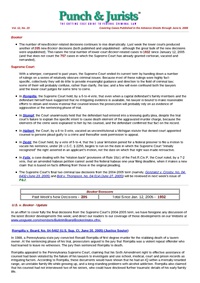Loaded on
June 1, 2005
published in Punch and Jurists
June 06, 2005
This case represents the latest attempt by the Supreme Court to resolve another of the many ambiguities created by the Antiterrorism and Effective Death Penalty Act of 1996 (AEDPA) in the field of habeas litigation. The underlying general question addressed by the Court in this case was when the …
Loaded on
June 1, 2005
published in Punch and Jurists
June 06, 2005
In his dissent, Justice summarized the import of this case by stating that it required the Court “to decide how the relation back provision of Rule 15(c)(2) of the Federal Rules of Civil Procedure ought to apply in federal habeas corpus cases, when neither text nor precedent provides clear …
Loaded on
June 1, 2005
published in Punch and Jurists
June 06, 2005
Here, by a 6-to-3 vote, the Supreme Court vacated as unconstitutional a Michigan statute that denied court appointed counsel to persons plead guilty to a crime and thereafter seek permission to appeal.
In Douglas v. California, 372 U.S. 353 (1963), the Supreme Court held that, in criminal proceedings, …
Loaded on
June 1, 2005
published in Punch and Jurists
June 06, 2005
Here the Court held, by a 5-to-4 vote, that even when a capital defendant himself has suggested that no mitigating evidence is available, his lawyer is bound to make reasonable efforts to obtain material he knows the prosecutor will rely on.
In 1988, a Pennsylvania state jury convicted …
Loaded on
June 1, 2005
published in Punch and Jurists
June 06, 2005
In this case, the court rejected the Government's argument that the defendant was ineligible for a three-level acceptance of responsibility reduction under § 3E1.1(b) because the PROTECT Act (which was passed after the defendant's offense) added a government motion requirement for the third-level reduction. And in so doing, the …
Loaded on
May 1, 2005
published in Punch and Jurists
June 06, 2005
A defendant has entered into a knowing guilty plea, despite the trial court’s failure to explain the specific intent to cause death element of the aggravated murder charge, where the elements of the crime were explained to him by his counsel.
In 1984, the respondent, John David Stumpf, …
